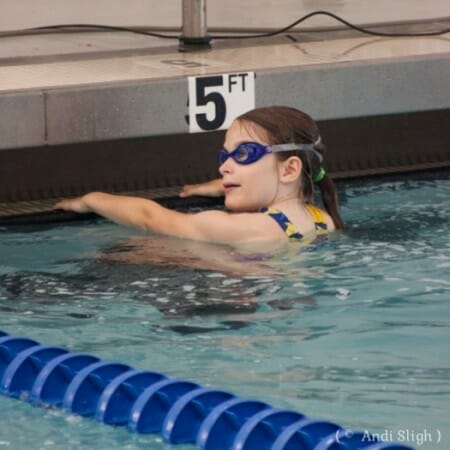This week we welcome back our friend, Andi Sligh, mother of two children with special needs, to talk about the benefits of swimming and encourage you to consider swim team for your child with special needs.
The dog days of summer are upon us, and there’s no better time than now to dip your toes in the cool water of a swimming pool. Some of my best memories from childhood are swimming in my aunt’s pool in the hot Alabama summers. At the end of the day, I was a wonderful combination of exhausted, ravenous, and sunburned – there was no SPF 50 back then!
Now that I’m older, I prefer lounging over a rousing game of Marco Polo, but my husband is a former masters swimmer, my twelve year old daughter is in her fifth year of swim team, and my son just completed his first session of swim lessons. In our family, we’re big fans of swimming – and we also happen to have two children with special needs.
Swimming and other aquatic activities aren’t exclusively for typical adults and children.
Those with physical disabilities can benefit from increases in range of motion, strength, endurance, motor planning, and trunk control. Kids with sensory issues receive increased tactile input in the water, and water increases proprioceptive input, encouraging body awareness. Of course, being able to swim, tread water, or (at a minimum) float is important for safety reasons, as well. Swimming is also something that children with special needs can do with their typical siblings and peers.
My daughter, who has spastic diplegia, a form of cerebral palsy, learned to swim at age six, and asked to join the local swim team a year later. I was hesitant, but after speaking with the coach, I decided to let her try. In the beginning, I went to every practice (with my newborn son in tow), certain that I needed to keep my eyes on her lest she drown.
Five years later, I’m officially a “swim mom” – a veteran of meets and fluent in swim jargon, and I haven’t watched a single practice all season. I’m not exaggerating when I tell you that swim team has changed our lives, and for the better.
The only summer my daughter didn’t swim was 2014. She underwent major orthopedic surgery on both legs and spent the entire summer doing physical therapy daily. The therapy continued throughout the school year, and on the one year anniversary of her surgery, she still wasn’t quite where we hoped she would be. Seven weeks of swim practice later, she’s in great shape and even her physical therapist has commented on what a difference it has made. Best of all? It’s a fun activity that she truly enjoys and is motivated to continue.
USA Swimming encourages inclusion of swimmers with disabilities in programs for all swimmers, but programs also exist for swimmers with intellectual disabilities, those who are deaf or blind, swimmers of short stature, those with limb loss, and swimmers with neurological conditions such as cerebral palsy. My daughter swims for a regular rec league team – and will join her middle school team in the fall – and it’s more than just a supplement to physical therapy. She gets to experience what it’s like to be on a team, has the opportunity to educate others on disability, and is able to compete…with herself. At her “comeback” meet this summer, she finished almost 30 seconds behind her nearest competitor, but she was ecstatic because she was eighteen seconds faster than the last time she swam the distance.
Of course, it isn’t necessary to join a team to benefit from swimming.
It was the best option for us, however. My daughter is willing to work a little harder for the young adult coaches than she might for me on a daily basis, and there’s a social aspect to it, as well. She also isn’t the only swimmer with special needs on the team: one of her teammates is diabetic and wears an insulin pump on his arm, and another has an intellectual disability, but in the water, they are all “just” swimmers.
Need more convincing? Check out this video from the 2012 Paralympics in London:
Swim team was a scary thing for my husband and me in those early days, but looking back five years later, it’s one of the best decisions we ever made.
UPDATE: Don’t miss coverage of the 2015 Special Olympics World Games, beginning this weekend on ESPN!
——-
Andi is an ordinary mom living an extraordinary life on the Alabama gulf coast with a daughter with cerebral palsy, a son with Down syndrome, an adventurous husband, a wild Westie, a rescued Schnoodle, a camera, and a worn out pair of running shoes. She blogs at BringingtheSunshine.com and is the author of There’s Sunshine Behind the Clouds: Surviving the Early Years as a Special Needs Mom, an ebook for parents of children with special needs.








